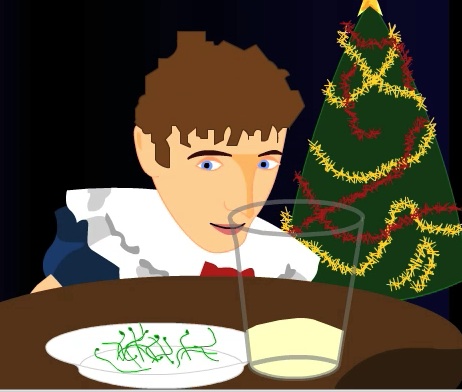Eurosurveillance reports today on an outbreak of Salmonella linked to raw alfalfa sprouts in summer 2007 in Sweden, which sickened at least 51 people.
Almost two years ago, Salmonella in mung bean sprouts sickened 650 Ontarians.
 Kingston, Ontario, was ground zero for the great Salmonella sprout outbreak of 2005. After 15 students at Queen’s University visited the emergency ward. puking and pooping, they tested positive for the same strain of Salmonella, a link was made to raw bean sprouts, and the city decided on Nov. 23, 2005 to warn the public. The next day, Dr. Sheela Basrur, Ontario’s Chief Medical Officer of Health, advised the entire province not to eat raw or cooked bean sprouts, including those from grocery stores, home refrigerators or those served at restaurants.
Kingston, Ontario, was ground zero for the great Salmonella sprout outbreak of 2005. After 15 students at Queen’s University visited the emergency ward. puking and pooping, they tested positive for the same strain of Salmonella, a link was made to raw bean sprouts, and the city decided on Nov. 23, 2005 to warn the public. The next day, Dr. Sheela Basrur, Ontario’s Chief Medical Officer of Health, advised the entire province not to eat raw or cooked bean sprouts, including those from grocery stores, home refrigerators or those served at restaurants.
 Like undergarments for Britney Spears, Lindsay Lohan and Paris Hilton, sprouts were de facto banned.
Like undergarments for Britney Spears, Lindsay Lohan and Paris Hilton, sprouts were de facto banned.
As the number of confirmed sick people rose into the hundreds, the Canadian Food Inspection Agency on November 25, 2005, finally issued an advisory for mung bean sprouts manufactured by Toronto Sun Wah Trading Inc. — the largest sprout growth facility in the province.
There was lots of press and a bit of outrage, but after bans, investigations, and promises of doing things differently, raw sprouts again became widely available, as soon as three weeks after the outbreak was identified. To borrow the words of a U.S. Food and Drug Administration official commenting on the return of fresh spinach to supermarket aisles in Oct. 2006, the product was "just as safe as it was before the outbreak."
And if it has, the Canadian public would be the last to know.
On December 16, 2005, Kingston lifted its city-wide ban on sprouts after receiving clearance from CFIA, but the local medical officer of health, Dr. Ian Gemmill, was reluctant, stating, "I’m all for getting a definitive answer to this, but so far, our colleagues at CFIA have not provided us with a process that will assure that bean sprouts are not contaminated."
They still haven’t.
Two years later, such advisories have been magically lifted and sprouts are being placed ever so gingerly on gourmet, supposedly healthy sandwiches, in the complete absence of any evidence that raw sprouts are any safer than they were before the outbreak.
The consumption of raw sprouts has been linked to over 30 outbreaks of foodborne illness throughout North America in the past 15 year affecting tens of thousands of people (a complete list of North American sprout outbreaks is available at http://www.foodsafetynetwork.ca/en/article-details.php?a=2&c=6&sc=36&id=865).
The first consumer warning about sprouts was issued by the U.S. Centers for Disease Control (CDC) in 1997. By July 9, 1999, FDA had advised all Americans to be aware of the risks associated with eating raw sprouts and that the best way to control the risk was to simply not eat raw sprouts. FDA stated that it would monitor the situation and take any further actions required to protect consumers.
At the time, Canadian media depicted the U.S. response as panic at the disco, quoting Health Canada officials who said while some people were at risk, sprouts were generally a low-risk product.
The 650 sick Ontarians were undoubtedly comforted by such assurances.
Sprouts, by nature, present a special food safety challenge because the way they
are grown — high moisture and high temperature — is also an ideal environment for bacterial growth. In addition to their cantankerous temperament, sprouts are impossible to wash, making CFIA’s standby warning to consumers to wash their produce even more pointless than usual.
Because of continued outbreaks, the sprout industry, regulatory agencies, and the academic community, at least in the U.S., pooled their efforts in the late 1990s to improve the safety of the product, including the implementation of good manufacturing practices, establishing guidelines for safe sprout production and chemical disinfection of seeds prior to sprouting.
That approach appears to have reduced the risk in the U.S. as the number of sprout outbreaks has declined. Not so in Canada, where CFIA routinely touts its best practices document.
But are these guidelines actually being followed? And even if they are, is anyone checking?
Thousands of sick people and two years after the world’s largest sprout-related outbreak, in a brazenly bizarre demonstration of Canadian politeness, no victims have stepped forward to complain (several have declined to go public at the last minute), no sprout growers have publicly defended their industry, no government-type has publicly stated why raw sprouts are now safe to eat, and no journalist has bothered to follow up. And there has never been any sort of official write-up on the outbreak.
Sprouts in Canada are just as safe and just as dangerous as ever. Sweden too.
Douglas Powell is scientific director of the International Food Safety Network at Kansas State University,
dpowell@ksu.edu
foodsafety.ksu.edu
donteatpoop.com
barfblog.com
785-317-0560
.jpg) cases of Salmonella Bareilly in England, Wales and Northern Ireland since the beginning of August with possible links to raw bean sprouts. Health Protection Scotland has investigated 19 confirmed cases in Scotland during the same period.
cases of Salmonella Bareilly in England, Wales and Northern Ireland since the beginning of August with possible links to raw bean sprouts. Health Protection Scotland has investigated 19 confirmed cases in Scotland during the same period.
 the bacteria in bean sprouts.
the bacteria in bean sprouts. I told them it was a tough job.
I told them it was a tough job. company owner and manager Quang “Mike” Trinh, and Hue Nguyen, the company production manager.
company owner and manager Quang “Mike” Trinh, and Hue Nguyen, the company production manager..jpg) Once again, it’s raw sprouts, and it’s not like it’s sprout season or something (unlike the often terrible turkey food safety advice the surfaces at Thanksgiving).
Once again, it’s raw sprouts, and it’s not like it’s sprout season or something (unlike the often terrible turkey food safety advice the surfaces at Thanksgiving)..jpg) The Michigan Department of Community Health (MDCH) and Michigan Department of Agriculture (MDA)
The Michigan Department of Community Health (MDCH) and Michigan Department of Agriculture (MDA).jpg) So many little tips that a bunch of $50-150K per year salaries sweated over.
So many little tips that a bunch of $50-150K per year salaries sweated over. On Aug. 9, 2009, the Canadian Food Inspection Agency announced
On Aug. 9, 2009, the Canadian Food Inspection Agency announced.jpg)
 Kingston, Ontario, was ground zero for the great Salmonella sprout outbreak of 2005. After 15 students at Queen’s University visited the emergency ward. puking and pooping, they tested positive for the same strain of Salmonella, a link was made to raw bean sprouts, and the city decided on Nov. 23, 2005 to warn the public. The next day, Dr. Sheela Basrur, Ontario’s Chief Medical Officer of Health, advised the entire province not to eat raw or cooked bean sprouts, including those from grocery stores, home refrigerators or those served at restaurants.
Kingston, Ontario, was ground zero for the great Salmonella sprout outbreak of 2005. After 15 students at Queen’s University visited the emergency ward. puking and pooping, they tested positive for the same strain of Salmonella, a link was made to raw bean sprouts, and the city decided on Nov. 23, 2005 to warn the public. The next day, Dr. Sheela Basrur, Ontario’s Chief Medical Officer of Health, advised the entire province not to eat raw or cooked bean sprouts, including those from grocery stores, home refrigerators or those served at restaurants. Like undergarments for Britney Spears, Lindsay Lohan and Paris Hilton, sprouts were de facto banned.
Like undergarments for Britney Spears, Lindsay Lohan and Paris Hilton, sprouts were de facto banned.